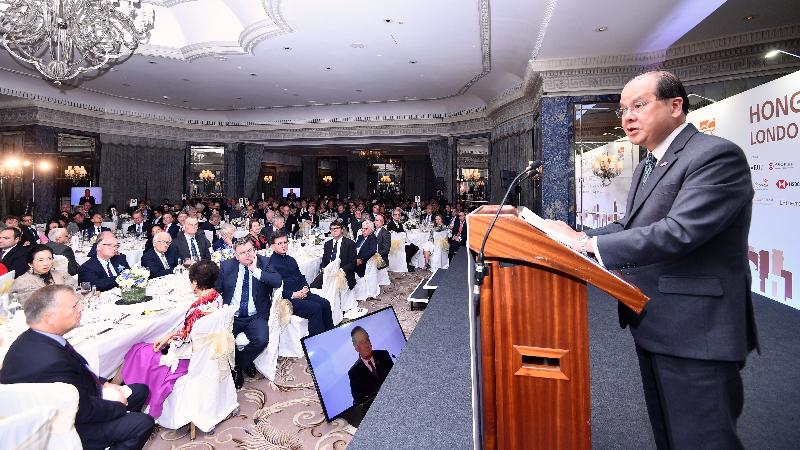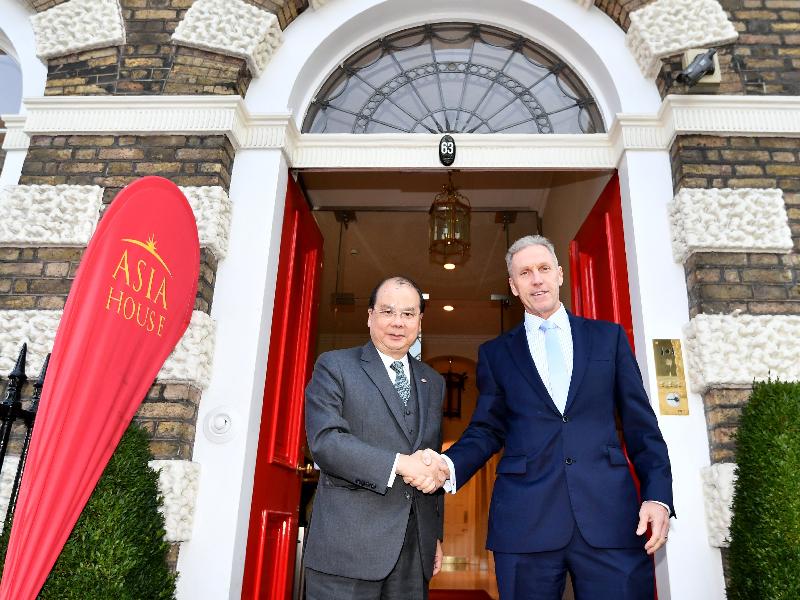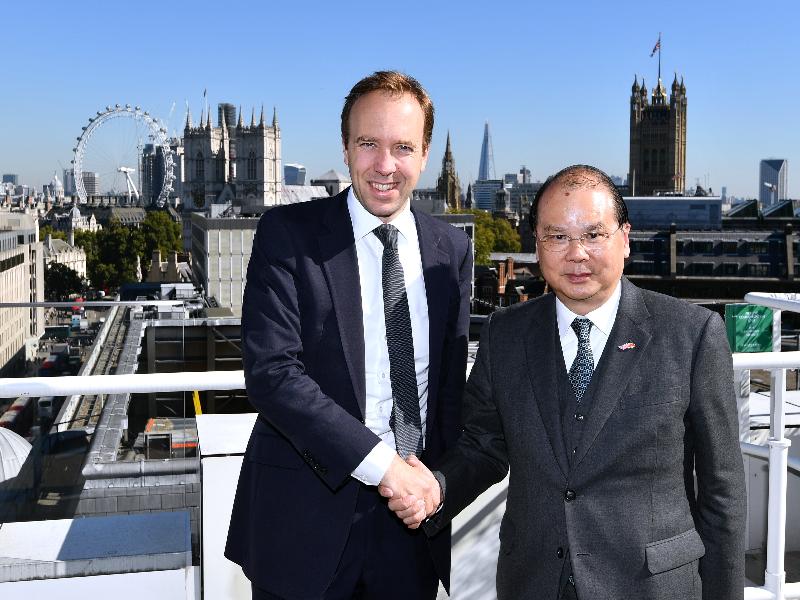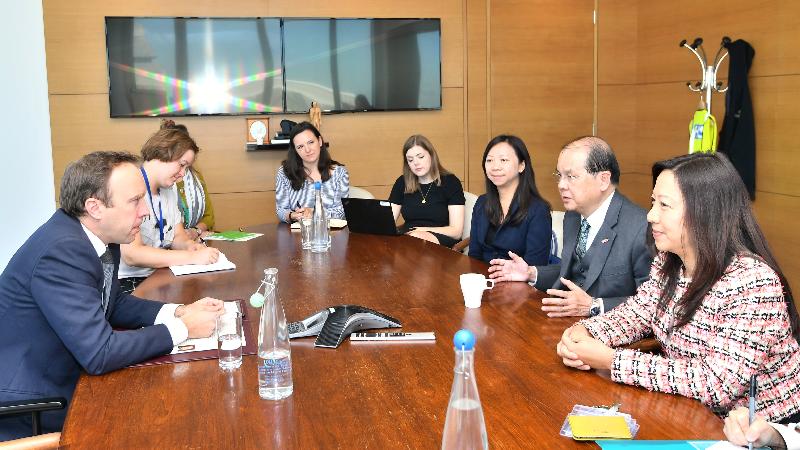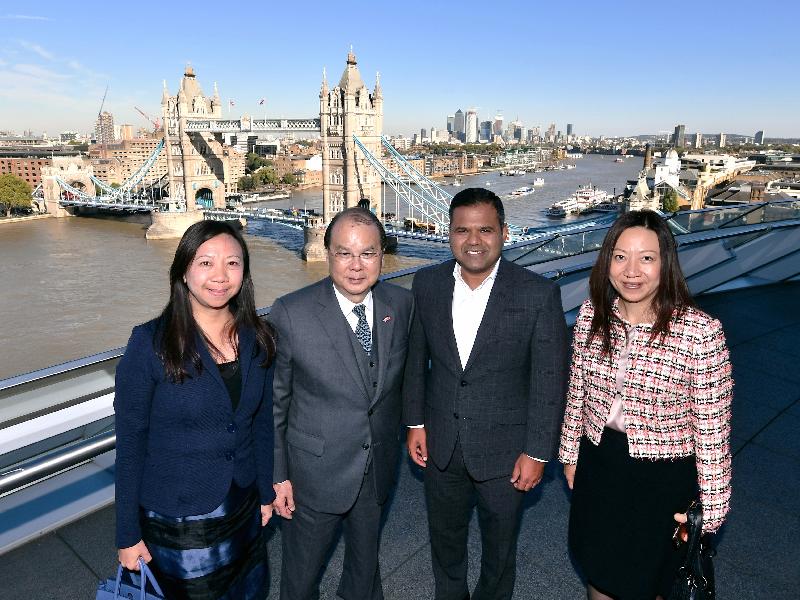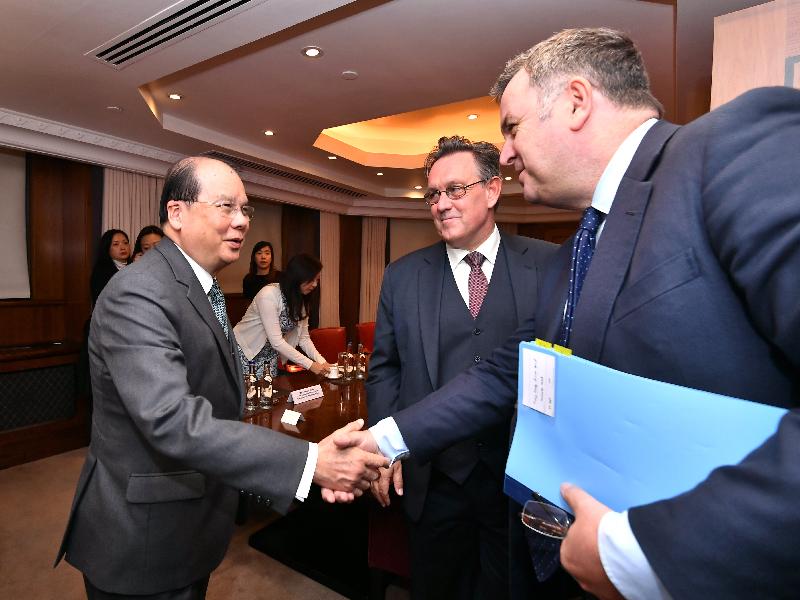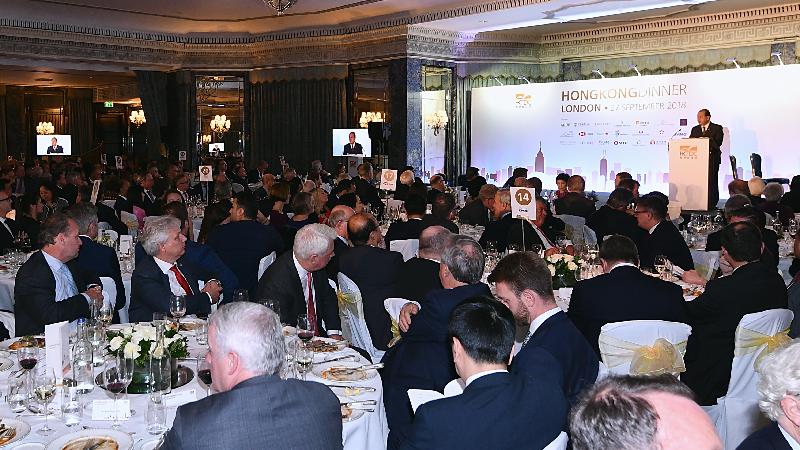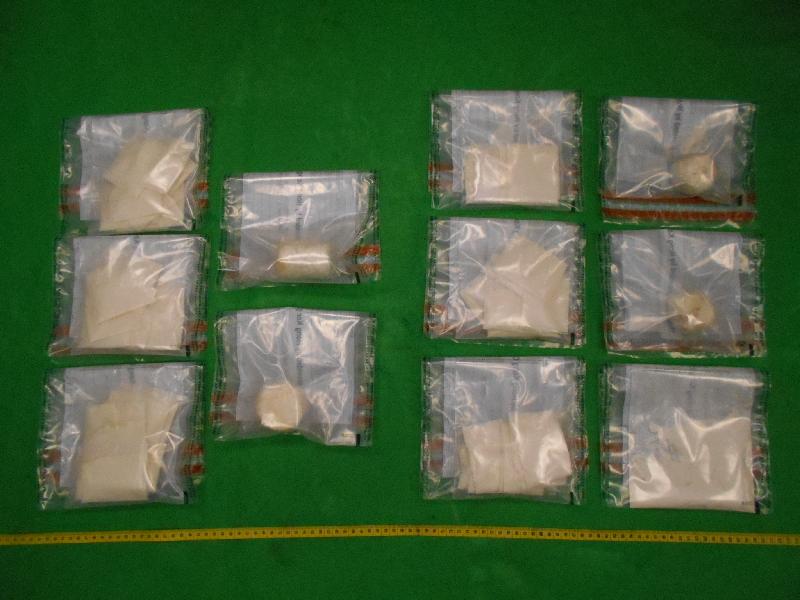Following is the speech by the Chief Secretary for Administration, Mr Matthew Cheung Kin-chung, at the Hong Kong Dinner held in London today (September 27, London time):
The Right Honourable Mel Stride (Financial Secretary to the Treasury and Paymaster General, United Kingdom (UK), Mr Mel Stride), Lord (David) Wilson (Member of the House of Lords), Baroness Dunn (Honorary President of the Hong Kong Association), Vincent ( Chairman of the Hong Kong Trade Development Council, Mr Vincent Lo), distinguished guests, friends of Hong Kong, ladies and gentlemen,
It is my great pleasure to join you all this evening. First and foremost, I must thank Mr Vincent Lo, the Chairman of the Hong Kong Trade Development Council for inviting me to this 35th edition of the Hong Kong Dinner in London. My warmest congratulations go to Vincent's team on the successful launch of this annual landmark event. This is indeed a most fitting and valuable occasion to celebrate the long and strong bond between the United Kingdom (UK) and Hong Kong.
I am most pleased that the Right Honourable Mel Stride has very kindly agreed to grace this occasion as our Guest of Honour.
Let me start with our economic scene. Overall, our economy is in good shape and our public finance sound and healthy. We expect a real GDP growth of 3 to 4 per cent this year and underlying inflation at 2.5 per cent. The unemployment rate is 2.8 per cent, the lowest in more than 20 years. The consolidated government surplus for the 2017-18 financial year was HK$149 billion and the fiscal reserves stood at HK$1,103 billion, equivalent to 28 months of government expenditure. We expect a broadly balanced budget for the next five years. Thus, Hong Kong is on an even keel.
Challenges
But creating and seizing opportunities is not always easy, especially amidst the current global economic and political climate. In Hong Kong, we have been monitoring closely the trade tension between the two giant economic powers. While the US$250 billion tariff measures imposed by the United States of America on exports from Mainland China are expected to have a relatively contained impact on Hong Kong's economic growth in 2018, we are mindful that if no compromise can be reached soon, the trade friction may cause more notable impact on Hong Kong later this year or next year.
In the face of this trade conflict, Hong Kong must remain vigilant and respond robustly to any protectionist policies or unilateral trade restrictive measures that may affect the interest of Hong Kong. In this respect, our Trade and Industry Department has set up a one-stop help desk to keep the trade fully abreast of developments and enable them to make appropriate response. We have also put in place a number of relief measures to support the trade, especially the small and medium-sized enterprises.
Trade war benefits no one. We hope that the United States and all parties could continue to resolve their disputes through bilateral consultations and the established mechanisms under the World Trade Organization.
Hong Kong Continues to Flourish
Free and Open Economy
Despite the challenges confronting Hong Kong, we are confident that Hong Kong will weather the storm, as proven by our track record of resilience in coping with global economic and financial fluctuations and crises in the past.
More importantly, the well-tried unique and innovative "one country, two systems" principle solidly underpins Hong Kong's continuing success. Under "one country", Hong Kong enjoys the full benefits of having the Mainland as our economic hinterland and shield. We have deepened our links across a wide spectrum of economic, financial, creative and social sectors as well as government-to-government relations at the central and provincial levels.
In parallel, the "two systems" allow Hong Kong to preserve our unique advantages, distinctive features and core values. These include our cosmopolitan flavour, our openness and connectivity on all fronts, our inherent institutional strengths, our rule of law, our status as a global financial centre (being ranked third behind New York and London), and an international trade and logistics hub. We are, and will remain, for a long time to come the financial capital and most open and international city of our country. In essence, Hong Kong enjoys the best of both worlds.
We also enjoy a high degree of autonomy in conducting our external trade relations. At this critical time, it is particularly important to reinforce the relationship with our established trading partners and, at the same time, develop new markets to broaden our development opportunities. The Hong Kong Special Administrative Region (HKSAR) Government will continue to strive to expand Hong Kong's international trade, including through signing free trade agreements and investment promotion and protection agreements with other like-minded trading partners,and expanding our network of overseas Economic and Trade Offices.
We now have a network of 12 Economic and Trade Offices in the world, with the latest addition being the Jakarta office as our second office in ASEAN, with which Hong Kong concluded a Free Trade Agreement (FTA) last year. Our FTA negotiations with Australia have reached the final stage. Meanwhile, we have firm plans to open new offices in Bangkok, Seoul, Mumbai, Moscow, Dubai and, in the longer term in Johannesburg and Mexico City and more. We have also agreed with the UK Government to start a Strategic Dialogue on Trade Partnership and have just signed a Fintech-Bridge agreement with the UK Government.
Whilst fostering our links with the Mainland, we are equally determined to reach out proactively and extensively to the world. We need to enhance our connectivity both internally and externally to maintain our visibility and presence on the world stage as a vibrant and business-friendly economy as well as a financial, business and logistics hub lying at the crossroads of the Asia Pacific region.
With these unique characteristics, Hong Kong maintains its ranking as the world's freest economy, rated number one by the US-based think tank Heritage Foundation for the past 24 years in a row. Just 30 years ago, the Canada-based Fraser Institute rated Hong Kong once again the freest economy in its 2018 World Report. This is encouraging. We will continue to build a robust institution framework, uphold our tradition of law, maintain an effective government and provide a level playing field. This should provide a favourable environment for our economy to thrive.
Robust Legal System
Of course, Hong Kong is not just a free and open economy. We are also a highly safe place. Our crime rate has fallen to a 44-year-low since 1994! Indeed, a recent international study ranked Hong Kong as the world's fifth safest city.
We are also a reliable and friendly place where contracts, copyright and intellectual property are all well protected, and where the rule of law, our well-established common law system and an independent judiciary give peace of mind to both the local and international community.
Hong Kong's unique association with other common law jurisdictions speaks for our judicial independence and helps maintain a high degree of international confidence in our legal system. Apparently, we are the only jurisdiction in the world which permits eminent judges of other common law jurisdictions to sit on the bench of the Court of Final Appeal (CFA), the highest appellate court in Hong Kong.
In July, the President of the UK Supreme Court, the Right Honourable Baroness Brenda Hale, joined the CFA as an overseas non-permanent judge. Baroness Hale is one of 14 eminent judges currently appointed to the CFA from other common law jurisdictions. Amongst these14 elite jurists, nine are from the UK, four are from Australia and one is from Canada.
This unparalleled arrangement of appointing overseas non-permanent judges to the CFA is clearly stipulates under Article 82 of the Basic Law, our mini-constitution. It helps to ensure the high quality and transparency of our judicial system, reinforces Hong Kong's judicial independence and enhances our links with other common law jurisdictions.
Investment Destination
No less important, our low and simple tax regime offers us another competitive edge as one of the most popular places for overseas enterprises to set up regional headquarters and offices. We have just introduced a bold two-tier tax regime to cut profits tax rate by half to 8.25 per cent on the first HK$2 million of profits of corporations with the remainder subject to the prevailing tax rate of 16.5 per cent, which is still low vis-à-vis most other jurisdictions.
To maintain our competitiveness, we are diversifying our economy by promoting new drivers to support sustainable growth, create jobs and foster business start-ups and expansion. One of these key drivers is innovation and technology (I&T), a vitally important sector that touches virtually all areas of the economy and society.
In this respect, we are moving swiftly into the financial technology (Fintech) era. Fintech development is harnessing the power of Hong Kong's strengths in finance, innovation and technology as well as legal and professional services, retailing, tourism and much more. With an enabling environment for Fintech, investment in Hong Kong-based Fintech companies rose to HK$4.3 billion in 2017, compared to HK$1.7 billion in 2016.
To strengthen the competitiveness of our banking sector, the Hong Kong Monetary Authority (HKMA) launched a Faster Payment System just last week, ushering Hong Kong further into the smart banking world. The Faster Payment System connects banks and stored-value facility operators, enabling people to transfer funds safely anytime and anywhere. What is more, it supports Renminbi payments, thereby enhancing Hong Kong's leading position as a global centre for offshore Renminbi business.
I&T Development
Beyond Fintech, we are proactively encouraging research and development across all industries. Our innovation and technology development has been given a much-needed shot in the arm by President Xi Jinping. He has not only endorsed Hong Kong's quest to become an international innovation hub, but also directed state agencies to open up science and technology funding of the Central People's Government for application by higher education and research institutions in Hong Kong
This year's Budget of the HKSAR Government has earmarked over HK$50 billion to promote Hong Kong's I&T development, including allocating HK$20 billion for the first-phase development of the Hong Kong-Shenzhen Innovation Technology Park located at the boundary with Shenzhen and in an area known as the Lok Ma Chau Loop. We also offer super tax deductions up to 300 per cent for research and development spending.
The Stock Exchange of Hong Kong is equally moving full steam ahead. It has introduced new dual-class share listing rules to attract more technological and biotech companies to list in Hong Kong. We welcome UK technological firms to consider initial public offerings in Hong Kong.
In fact, there is so much to tell about Hong Kong's innovation and technology development that I have prepared a short video specifically for this dinner. So please take a few minutes to enjoy this free world premiere!
Nurture Talent
Hong Kong has all along been a hotbed for opportunities. We are determined to build a talent pool for the long-term prosperity of Hong Kong. To this end, we have set up various high-level advisory committees. Amongst these, the Commission on Children, the Youth Development Commission and the Human Resources Planning Commission are all under my chairmanship.
Through these bodies, we will oversee holistically the key development stages of our next generation, from childhood and youth development to career planning. This way, we can help our young people chart their way forward and upward as well as realise fully their potential and aspirations. Last month, the Human Resources Planning Commission promulgated the first-ever Talent List of Hong Kong to attract quality people from around the world. Our aim is to attract international talents so as to create cluster effects, stimulate the development of local talents and propel Hong Kong forward.
Greater Bay Area and Belt and Road Initiative
Ladies and gentlemen, I have mentioned a few focused areas for Hong Kong's economic development. It is important to note that our city's growth potential is intertwined with that of our motherland – the world's second largest economy.
Moving forward, Hong Kong's strengths as a well-connected global business, financial and logistics hub will play an important part in our country's far-reaching economic initiatives – the Guangdong-Hong Kong-Macao Greater Bay Areaand the Belt and Road Initiative.
The Greater Bay Area aims to unleash the economic potential of the cluster of 11 cities in the Pearl River Delta region, including Hong Kong, Macao and nine cities in Guangdong Province. Hong Kong has a key role to play in the Greater Bay Area given our strong global connectivity, well-established institutional strengths, and competitive edge in trade, finance, logistics, innovation and legal services. We provide an important platform for Mainland enterprises to go global and overseas investments to penetrate the huge and lucrative China market.
To put the scale of this development into perspective, the Greater Bay Area covers a population of nearly 70 million, similar that of the UK; generates GDP of around GBP 1.2 trillion, over half that of the UK or the size of Korea and Australia; and spans an area of 56 000 square kilometres which is nearly three times the size of Wales! The Greater Bay Area is thus a huge market in its own right.
Brand new mega transport infrastructure, including the Guangzhou-Shenzhen-Hong Kong Express Rail Link and the Hong Kong-Zhuhai-Macao Bridge will significantly reduce travel time, cut costs, promote connectivity and boost the flow of capital, talents, goods, business and information in the region.
Just last weekend (September 23), the Guangzhou-Shenzhen-Hong Kong Express Rail came on stream. The Vibrant Express, as the sophisticated trains are most fittingly named, links dynamic Hong Kong with the Mainland's state-of-the-art express rail network covering more than 25 000 kilometres, including services to Guangzhou in 48 minutes and Beijing in less than nine hours. Meanwhile, the impressive Hong Kong-Zhuhai-Macao Bridge, which has been described as the mega project of the century, is expected to spring to life soon. It is the world's longest bridge-and-tunnel sea crossing, spanning 42 kilometres across the Pearl River Estuary and linking Hong Kong with Zhuhai and Macao.
Meanwhile, construction work on the third runway system is under way at Hong Kong International Airport at Chek Lap Kok. Our airport is the world's largest air cargo hub, handling close to 5 million tonnes of cargo in 2017, and one of the busiest for passengers, handling nearly 73million in 2017. Once the Three Runway System takes off in 2024, our airport will be able to handle altogether 9 million tonnes of air cargo and over 100 million passengers annually.
These mega infrastructure projects will further consolidate Hong Kong's pivotal role in the Greater Bay Area for many years to come. In fact, the Greater Bay Area is also a key intersection of the far-reaching Belt and Road Initiative, serving as a converging point for the flows of trade, investment and talent between Mainland China, Southeast Asia and all the way to Europe.
The Belt and Road Initiative is a mammoth national strategy, promoting land, sea, energy, financial and cultural links amongst more than 60 countries in Asia, Africa and Europe. These countries account for about 31 per cent of global GDP and 33 per cent of global merchandise trade. Links include a freight railway that runs all the way from London to Yiwu in Zhejiang, China, a distance of some 12 000 kilometres that takes less than 20 days or roughly half the time it takes to ship goods by sea.
Whilst the Greater Bay Area and the Belt and Road Initiative are grand visions on a macro scale, they clearly indicate opportunities for closer partnership between Hong Kong and the UK in such areas as finance, legal services, investment and people-to-people links.
At this juncture, allow me to show another two short videos that shed more light on the huge opportunities flowing from the Greater Bay Area and the Belt and Road Initiative. And seeing is believing.
Ladies and gentlemen, friends of Hong Kong, before I conclude my speech, let me say that this year marks the 40th anniversary of the reform and opening up of our country. This is a historic and momentous occasion. As most of you are aware, Hong Kong was a key contributor and important catalyst in this major economic transformation through our substantial investment and transfer of management skills and good business practices into Mainland China.
In return, Hong Kong also benefited greatly in the process and managed to turn ourselves from an essentially manufacturing-based economy and entrepôt into a high-value-added service economy, a thriving business and logistics centre and a world-class financial hub. This successful metamorphosis on both sides of the Shenzhen River is a shining example of effective synergy, close collaboration and comparative advantages at full play.
As a third-generation bona fide Hong Kong belonger born, bred and educated locally and as the longest-serving senior government official who has dedicated his whole working life to serve the people of Hong Kong and contributed to Government of Hong Kong for 46 years continuously and humbly with one heart, one mind and one purpose, I can assure you that Hong Kong, as Asia's world city, will remain for many years to come an international metropolis full of vibrancy, vitality, diversity, opportunities and promises. The Pearl of Orient will continue to shine and glitter forever. Hong Kong will no doubt continue to forge ahead with full vigour.
On this upbeat note, let me thank the TDC profusely once again for having me here tonight and for staging this successful and warm annual permanent fixture. I also wish you all a very enjoyable evening. I much look forward to the pleasure of welcoming or reuniting with you all in Hong Kong before long. Thank you.
